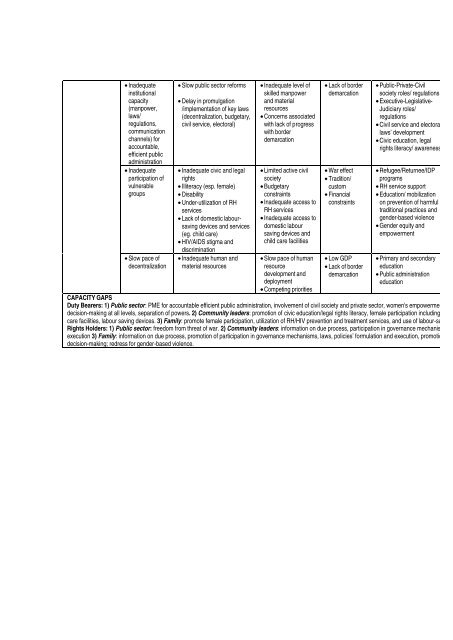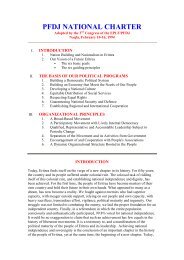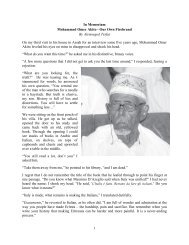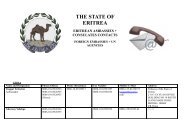Common Country Assessment (CCA) - ECSS | Eritrean Center for ...
Common Country Assessment (CCA) - ECSS | Eritrean Center for ...
Common Country Assessment (CCA) - ECSS | Eritrean Center for ...
Create successful ePaper yourself
Turn your PDF publications into a flip-book with our unique Google optimized e-Paper software.
• Inadequate<br />
institutional<br />
capacity<br />
(manpower,<br />
laws/<br />
regulations,<br />
communication<br />
channels) <strong>for</strong><br />
accountable,<br />
efficient public<br />
administration<br />
• Inadequate<br />
participation of<br />
vulnerable<br />
groups<br />
• Slow pace of<br />
decentralization<br />
• Slow public sector re<strong>for</strong>ms<br />
• Delay in promulgation<br />
/implementation of key laws<br />
(decentralization, budgetary,<br />
civil service, electoral)<br />
• Inadequate civic and legal<br />
rights<br />
• Illiteracy (esp. female)<br />
• Disability<br />
• Under-utilization of RH<br />
services<br />
• Lack of domestic laboursaving<br />
devices and services<br />
(eg. child care)<br />
• HIV/AIDS stigma and<br />
discrimination<br />
• Inadequate human and<br />
material resources<br />
• Inadequate level of<br />
skilled manpower<br />
and material<br />
resources<br />
• Concerns associated<br />
with lack of progress<br />
with border<br />
demarcation<br />
• Limited active civil<br />
society<br />
• Budgetary<br />
constraints<br />
• Inadequate access to<br />
RH services<br />
• Inadequate access to<br />
domestic labour<br />
saving devices and<br />
child care facilities<br />
• Slow pace of human<br />
resource<br />
development and<br />
deployment<br />
• Competing priorities<br />
• Lack of border<br />
demarcation<br />
• War effect<br />
• Tradition/<br />
custom<br />
• Financial<br />
constraints<br />
• Low GDP<br />
• Lack of border<br />
demarcation<br />
• Public-Private-Civil<br />
society roles/ regulations<br />
• Executive-Legislative-<br />
Judiciary roles/<br />
regulations<br />
• Civil service and electoral<br />
laws’ development<br />
• Civic education, legal<br />
rights literacy/ awareness<br />
• Refugee/Returnee/IDP<br />
programs<br />
• RH service support<br />
• Education/ mobilization<br />
on prevention of harmful<br />
traditional practices and<br />
gender-based violence<br />
• Gender equity and<br />
empowerment<br />
• Primary and secondary<br />
education<br />
• Public administration<br />
education<br />
CAPACITY GAPS<br />
Duty Bearers: 1) Public sector: PME <strong>for</strong> accountable efficient public administration, involvement of civil society and private sector, women's empowerment, pro<br />
decision-making at all levels, separation of powers. 2) Community leaders: promotion of civic education/legal rights literacy, female participation including use o<br />
care facilities, labour saving devices. 3) Family: promote female participation, utilization of RH/HIV prevention and treatment services, and use of labour-saving<br />
Rights Holders: 1) Public sector: freedom from threat of war. 2) Community leaders: in<strong>for</strong>mation on due process, participation in governance mechanisms, la<br />
execution 3) Family: in<strong>for</strong>mation on due process, promotion of participation in governance mechanisms, laws, policies’ <strong>for</strong>mulation and execution, promotion of f<br />
decision-making; redress <strong>for</strong> gender-based violence.





